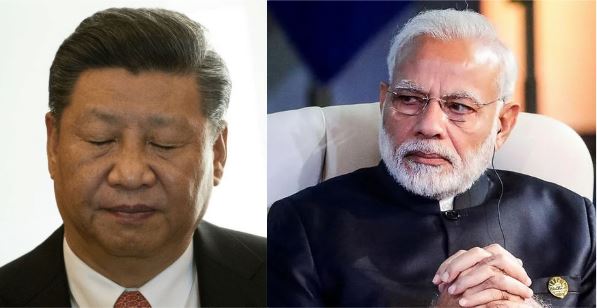Prime Minister Modi has struck China and struck hard. Amidst the ongoing military stand-off between India and China at the Line of Actual Control (LAC) in Eastern Ladakh, he has carried out a digital strike against the Dragon.
In a move that shows intent to hit where it hurts the most, the Modi government has banned 59 Chinese apps. China has thus been edged out of India’s growing and high-value app market. New Delhi has thus conveyed to Beijing that it has a diversity of options to hurt China in retaliation to the military build-up along the LAC.
The government has banned these apps saying they are engaged in activities that are “prejudicial to the sovereignty and integrity of India, defence of India, security of state and public order.”
This is the first big move that India has taken to harm China’s economic interests. India is behaving like a first-world country here- using its massive market to punish China for border aggression. Some of the biggest apps, including TikTok, SHAREit, UC Browser and CamScanner have been thrown out.
India has a demographic advantage to go along with 800 million smartphone users, half of whom are below 25 years of age and hungry for mobile apps. The Chinese apps themselves were making millions of dollars in India which has some of the lowest internet usage costs across the world. In fact, India was one of the biggest markets for some of these Chinese apps.
TikTok itself is currently the most downloaded app in India with over a whopping 120 million active users. In fact, 30 per cent of this video-sharing social media app’s downloads came from India. Though India’s share of revenue to TikTok was lower than that of China and the US, it is India where this app was supposed to grow into a giant.
The Chinese app was supporting 15 Indian languages because it was seeking penetration into India’s hinterland, an ambition that has been thwarted by PM Modi’s bold digital strike.
Last year, when TikTok was banned temporarily, ByteDance which owns the app had disclosed in a court filing that it was losing out on half a million dollars every day. TikTok alone is going to lose out on millions of dollars.
SHAREit is even more popular than TikTok in India. It is the third most active app in the country after WhatsApp and Facebook, with more than 400 million downloads. But Prime Minister Modi has suddenly demonetised the Chinese app.
A few interesting stats about Chinese apps in India:
– TikTok: 611 million downloads in India (30% of total)
– SHAREIt: 3rd most active app in India after WhatsApp and FB
– UC Browser has 13% market share in India (2nd to Chrome at 75%)https://t.co/uOyN8vPJrL
— Dhruva Jaishankar · ध्रुव जयशंकर (@d_jaishankar) June 29, 2020
CamScanner and UC Browser are also going to lose out massively with this retaliatory measure. With a 13 per cent market share in India, UC Browser was the second most popular search engine in India, next only to Google Chrome.
Ever since military tensions started escalating between India and China, there were boycott calls within India. But Beijing lived in the illusion that India cannot insulate its market from Chinese influence.
CCP mouthpiece and Chinese Foreign Ministry’s propaganda tabloid, Global Times even warned of punishment if India boycotted Chinese products or removed Chinese apps.
But China has clearly been caught napping. Had India banned physical Chinese goods, Beijing could have moved the World Trade Organisation (WTO), but now it has no real remedy. India has punished it for border aggression, and this is going to sting.
Meanwhile, Chinese foreign ministry spokesperson Zhao Lijian has said, “China is strongly concerned, and we are verifying the situation.”
Of course, China is concerned because the ban on Chinese apps can easily escalate into a voluntary boycott of Chinese goods in India.
The Confederation of All India Traders (CAIT) has said that the ban will be a big support to the ‘Boycott Chinese Goods’ campaign. CAIT, the apex body of trader’s union, has already decided to boycott Chinese goods worth more than 1 lakh crore rupees- 13 billion dollars approximately- by December 2021. It has even prepared a list of 3,000 items for which good indigenous alternatives are available.
Before China awakens to the reality of changing Sino-India relations, it might have already paid dearly for crossing the dangerous red line in Eastern Ladakh.
India’s move is also going to have geopolitical repercussions. Officially, this is not a defence move but a national security move that India has taken. There are already apprehensions of private Chinese companies owing allegiance to the Chinese Communist Party (CCP).
They face allegations of snooping for the CCP regime. Piles of Indian data is entering Chinese servers which are not immune to exposure to the Chinese government. The CCP is suspected to use it for spying and controlling the Indian market, the Indian consumer, and for furthering a political agenda which is detrimental to peace and harmony in India. Moreover, this Indian data is fueling China’s tech giants, driving massive net profits without China actually reciprocating as it never gave free access to Indian vendors in the Chinese market.
Prime Minister Modi’s move to ban them thus creates a strong precedent for more national bans on Chinese apps in democratic countries like the US, the UK, Australia and Taiwan.
